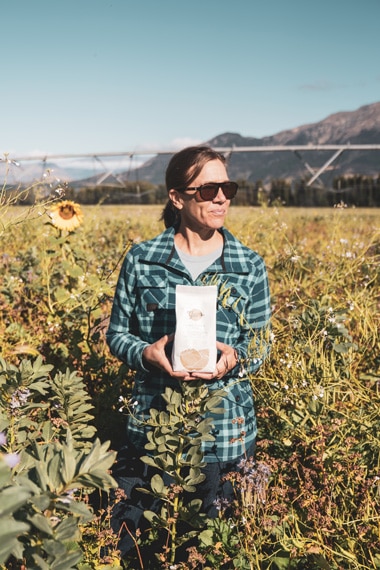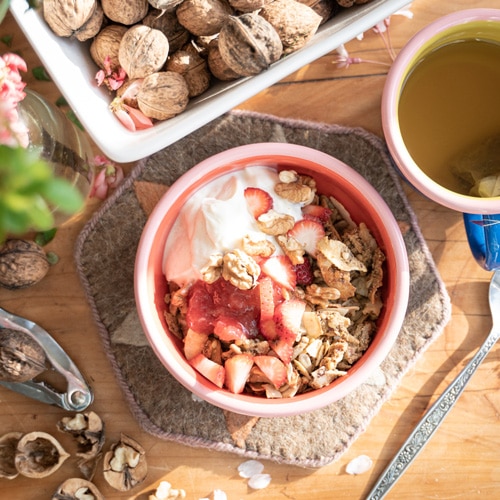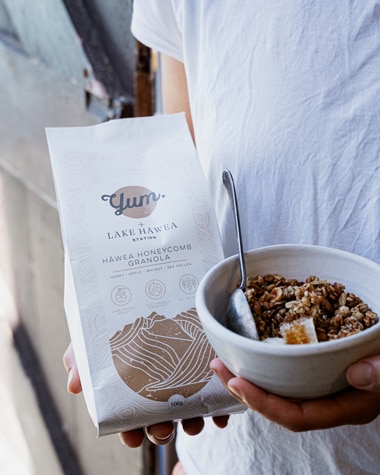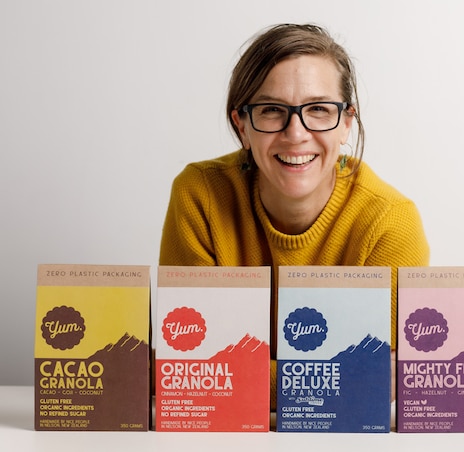1. What was the inspiration behind Yum Granola?
I came up with the idea to make Yum while working as a sous-chef at the iconic Whare Kea Lodge & Chalet in Wanaka, New Zealand. We had a (really) small team making bespoke, new degustation dinner menus daily, often without time to make a high-quality breakfast cereal for our guests. On a personal note, I worked long, chef hours, and often skipped meals, especially breakfast because I could never find a breakfast that would sustain me or that didn’t make my tummy hurt (I have trouble digesting grains). So, there were these two, separate, breakfast needs that required a solution.
2. What is coming up for you this year?
This coming year is an exciting one for us at Yum. We just moved into a new production facility right in Nelson (New Zealand) which will allow us to grow. We are also only a few weeks away from launching into the outdoor market with a sustainable (and sustaining) breakfast option for multi-day hikers, bikers, etc. We are excited as this market has a lot of care for their environmental impact, with the only meal solutions on the market made from single-use hard plastic that has an infinite shelf life and will never break down in the landfill (or oceans). Bushline Breakfasts (by Yum) will offer an incredible tasting, sustaining breakfast in home compostable (zero plastic) packaging.
3. Electrolux is a Swedish brand. What about Swedish cuisine or ways of living do you admire or feel most inspired by?
Well, I have some Swede in my blood and was raised on pickled herring, served proudly by my great grandma. Aside from that, I attribute Swedish cuisine with being wholesome and very seasonal and regional.

4. Electrolux has a Better Living 2030 program that encourages people to employ more sustainable approaches to living. What are some tips you can share on living more sustainably?
Every year we do a giveaway where we ask people how they will continue Plastic Free July beyond the month of July. It is always super inspiring to hear what people are doing and it proves the smallest actions, done consistently, can make a big impact. At Yum, we have zero food waste as we make Yum fresh each day and operate quite lean, which means we don’t have a lot of inventory sitting around in a warehouse. We are big believers in reusing, recycling and refurbishing anything that we can, and composting! With that, we minimize buying anything that is single-use and if we have to, think about how we can continue the use of the packaging.
At Yum we have an Honesty Box outside of our factory which allows people to drop off their containers to be filled with a fresh batch of Yum, again, reducing the dependency on single-use packaging. I love selling Yum without packaging. It makes me very proud.
5. What is your approach to sustainability and how has it changed over the past decade?
I think I am really lucky because both Mike (my life partner and business partner at Yum) and I are very resourceful people. We think beyond the short-term and try to make everything work with the smallest of resources. Each year I am getting more and more into growing organics from seed at our home, which to me breeds a self-sufficiency that helps being sustainable that much easier.
6. What does living sustainably mean to you?
Living sustainably means to me, minimizing any negative impact on the planet, and ultimately leaving a positive impact. I’m a bit of an idealist so I live in my own bubble doing all I can to look after the planet. I believe in minimizing dependency on plastics as much as possible, so I do all I can to avoid using and buying plastic products, as well as items in plastic packaging.

7. How do you practice sustainability every day?
At home, we compost daily, recycle everything we can, and try to use items for as long as possible. We ride our bikes or walk to work. We have an electric car and an e-bike, both of which we use A LOT. We try to minimize shopping at supermarkets because this is where the majority of plastic packaging comes from. At Yum we source our ingredients thoughtfully, being organic and local as much as possible.
8. In your industry, what are the biggest sustainability challenges?
The costs associated with being sustainable– using zero plastic or earth-friendly materials in our packaging comes with a cost that we have to pay for. We can’t expect the consumers to pay for this. We make less margin/profit because we are making better decisions for the planet. But we could not do business any other way. It is who we are as human beings and Yum reflects that. We are proud of Yum because we believe it to be making a bigger impact than we could have been making as individuals.
9. What sustainability successes have you had, that you would share with either other businesses in your industry or people at home?
About 4 years ago we decided to stop using single-use plastics in our packaging, instead using a NZ-made cardboard box that everyone could recycle at their curb, and an inner compostable bag made of cellulose that is home compostable. We also switched our bulk, 1kg bags to compostable, and later to paper recyclable as we believe a solution is the one that the majority of people have access to. This is probably one of our biggest successes. Aside from that, there are smaller wins, like our recent collaboration with Lake Hāwea Station for a 100% NZ grown granola, our Hāwea Honeycomb Granola. Sourcing all the ingredients from New Zealand is no easy feat, but one that taste of provenance and has travelled the least distance of any. These wins make us most proud of Yum.

Find out more about YUM Granola here:






